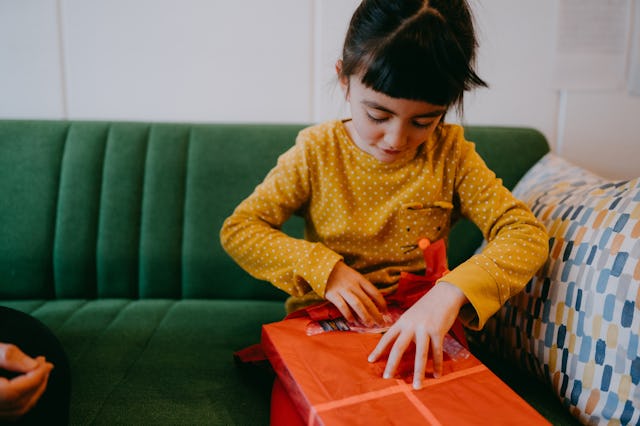Should We Be Teaching Our Kids To Lie When They Get Gifts They Don’t Like?
An etiquette expert and a developmental psychologist weigh in on the debate.

Grown-ass women know there are times — few if you’re lucky, many if you’re me — when you just don’t like the gift you open. Awkward. But even more awkward is witnessing your kid unwrap a gift, then declare they don’t like it... with the gift-giver in earshot.
So, what’s a parent to do when their kid tactlessly dismisses a gift (besides crawl under a pile of decimated wrapping paper)? Should we be teaching our kids to lie?!
I asked an etiquette expert and a child psychologist for their ~professional~ opinions and uncovered two schools of thought.
Team “Let’s-Not-Lie”
If you’d like to raise honest kids — and hey, who doesn’t? — encouraging them to lie to protect a gift-giver’s feelings isn’t exactly ideal, says Nick Leighton, co-host and producer of the etiquette podcast Were You Raised by Wolves? Another thing? It’s not necessary.
Think about it: No one says a recipient has to specifically comment on a gift they get, Leighton tells me, especially if they hate it. So, instead of teaching our kids to spin a whole web of dishonesty, he suggests encouraging them to graciously receive presents they don’t actually appreciate by identifying something they *are* grateful for — like the fact that someone did something thoughtful and generous for them. To mind their manners, they should express those things.
Parents on the sidelines are welcome to embellish. “If you want to express enthusiasm that surpasses what you are feeling to be mindful of a gift-giver’s feelings, that’s fine,” Leighton tells me, “but I don’t think we ever want to lie. That’s not the example we want to set for our kids.”
Team “Just-Tell-Them-You-Love-It”
On Team “Just-Tell-Them-You-Love-It” is Aliza Pressman, Ph.D., a developmental psychologist and co-founding director of The Mount Sinai Parenting Center at Mount Sinai Hospital’s Icahn School of Medicine and the author of The 5 Principles of Parenting.
Gratitude, she tells me, isn’t a matter of telling the truth or lying. “It’s about thanking a person who took the time and thought to get a present for their effort, no matter what that present is or how much we do or don’t like it,” she says.
While Pressman acknowledges that it’s in everyone’s best interest to minimize outright deception, it’s really NBD if you encourage your kids to say they love their gift when they’re actually not that into it. That’s because feigning infatuation with a present is a “pro-social” lie — one that facilitates connections between people and does no harm, she tells me. Besides, by saying, “Thank you, I love it,” your kid is sparing the feelings of another person. No malice there!
To be clear, no one is saying that lying should be permitted in every scenario. “If we want to raise honest children, we have to make sure that our lies are pro-social and reserved for when they are necessary,” Pressman notes.
Kids older than 7 should be able to understand when truth-stretching is warranted, she says. But because younger kids may not be cognitively sophisticated enough to understand moral nuances, it’s best for them to stick with a simple “thank you” — something you can practice before a gift exchange and work on all year long.
Redemption When Kids Go Rogue
Luckily, there’s one thing we can all agree on: If your kid lets their gift disappointment out of the bag with a horrifying “I already have that!” or a straight-up “I don’t like this,” it’s your job to step in to model good behavior, Leighton says. Interjecting with something like, “Wasn’t it thoughtful for Grandma and Grandpa to think of you? Isn’t that nice?” can help steer the conversation away from cringy rejection.
If the moment can’t be redeemed, don’t beat yourself up. A thank you note written for or by your child (if they’re old enough) to recognize the thoughtful gesture and express appreciation for quality time spent together can serve as retroactive damage control.
You can also embrace your child’s slip-up as a teaching moment. “It can be hard for kids to learn that it’s in our collective interest to be mindful and kind, that our behaviors affect other people,” Leighton says. A little refresher on the golden rule can help. Ask your kid, “If you gave your grandma a gift and she threw it on the ground, how would you feel?”
Regardless of how badly your kids disrupt otherwise festive gift-giving, try not to let your disappointment spiral into feeling ungrateful for your ungrateful children, warns Pressman. “As parents, we can manage our expectations so we won’t get frustrated,” she says. Kids will be kids, after all.
Regardless of whether you successfully encourage yours to fake excitement over every gift, Pressman says a deeper sense of gratitude should naturally emerge as your kids get older — meaning you’ll eventually be off the hook here (and probably grateful for that!).
This article was originally published on